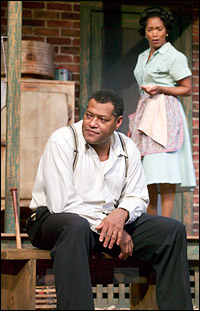
*
For Laurence Fishburne, portraying the late Supreme Court Justice Thurgood Marshall on Broadway is all about learning.
"Before I read the script, what I knew about him, like most people, was that he was the first African American appointed to the United States Supreme Court," Fishburne says. "I didn't know he was this legendary trial lawyer. I didn't know he was the lead trial lawyer in Brown v. Board of Education, the 1954 Supreme Court decision that abolished school segregation and affected the way all Americans live today. I didn't know that in the '50s he was called 'Mister Civil Rights.'"
What he wants for his audiences, Fishburne says, is that they "learn the same things I'm learning — not just about a man's life but what that man's life's work has done for us as a country. He used the law as his weapon, and he really changed the way things are."
The play Fishburne is talking about is, appropriately, called Thurgood. It's a one-man show, and it's at the Booth Theatre for a limited engagement. The author is George Stevens, Jr., and the director is Leonard Foglia; it follows Marshall from his childhood on the streets of Baltimore all the way to the Supreme Court. This is not Fishburne's first Broadway outing. His record is lustrous: In 1992 he won a Tony Award for Best Featured Actor in a Play — as well as a Drama Desk Award, an Outer Critics Circle Award and a Theatre World Award — as Sterling Johnson in August Wilson's Two Trains Running. In 1999 he starred, opposite Stockard Channing, as King Henry II in a revival of The Lion in Winter at the Roundabout Theatre. Among his many roles on the big screen, he was nominated for a Best Actor Oscar in 1993 as Ike Turner in "What's Love Got to Do With It."
Fishburne says that when he was offered the role of Marshall, "I didn't feel it was an option to say no. Part of that comes from the play's function to educate people, how we've all been able to benefit from what Marshall did." But there's something else, he says — a very deep meaning from his own experience.
"Back in 1978, when I was still in high school, I went to see a Broadway show, Paul Robeson, starring James Earl Jones. It was all about Robeson's journey as a human being, an artist, a champion of civil rights. Had I not seen the play, I might not have known who Robeson was. I was certainly never taught about him in school. Nobody in my family mentioned him to me. And it was a powerful experience."
| |
 |
|
| Laurence Fishburne with Angela Bassett in Fences. | ||
| photo by Craig Schwartz |
That idea made him feel very good, he says. And he is "certain that if groups of schoolchildren — white, black or Techni-color — come to see Thurgood," they will feel the same way. "And if any of them has an interest in law, the history of law in this country and how the law can be used to improve lives, they will be inspired to pursue that career."
He wants to emphasize, though, that the play is not just educational. "It's also a lot of fun. Marshall was not just this champion of civil rights or this fantastic trial lawyer. He was a wonderful storyteller. Everything written about him mentions that fact and his wonderful sense of humor. He was the most engaging man, who had the ability to make people feel comfortable under any circumstances — even his enemies. That means there are plenty of occasions for me to play for levity. I haven't really had the chance to do this — I'm not actually known for comedy. But I'm really excited to get that chance."
This is also a very busy movie year for Fishburne. His forthcoming films include "21" with Kevin Spacey (now in theatres), "Days of Wrath" opposite Amber Valletta and Wilmer Valderrama and "Newport 56," about the life of Duke Ellington. But for now, the one-man-play's the thing.
"I return to the stage first and foremost because I'm an actor, and I love it," Fishburne says. "Some people think of me as an actor and some as a movie star, so I sort of guess that makes me both. I love making movies and I love playing on the stage.
"Doing this play is a huge responsibility, but it's also a huge opportunity for me to grow. Playing solo with an audience for an hour and 30 minutes without a break means I have to, as the jazz cats say, get into the shed and work on my chops."










